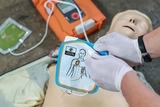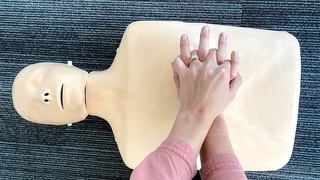

Did you know about 23,000 children and teens experience a sudden cardiac arrest (SCA) each year? Many of these result in death but could be prevented with greater awareness of the early warning signs and quick response in the event of an arrest. Sudden cardiac arrest can happen to anyone at any time. Learn how you can be prepared to save a life.
Know the early warning signs
Early warning signs of sudden cardiac arrest include:
- Racing heart rate or heart palpitations
- Dizziness or lightheadedness, especially with exercise
- Fainting when excited, startled, during exercise or right after exercise, or repeated unexplained fainting
- Seizures during or immediately after exercise
- Chest pain or discomfort with exercise
- Excessive shortness of breath or unusual fatigue during exercise (not related to asthma)
A family history of heart problems can also raise a person’s risk of SCA, even when heart problems have never been diagnosed. Red flags include:
- A family member who has experienced sudden cardiac arrest
- A family member with repeated unexplained fainting or seizures
- A family member who died suddenly before age 50 or a family history of sudden unexplained infant death, drowning or unexplained motor vehicle accidents
- A family history of heart disease or abnormalities
For more information, read “Know the Warning Signs: How You Can Prevent Sudden Cardiac Death.”
Be prepared
When a person experiences sudden cardiac arrest, quick action (within two to three minutes) is needed to save their life or prevent irreparable brain damage. The two most effective rapid responses are cardiopulmonary resuscitation (CPR) and defibrillation with an automated external defibrillator (AED).
Unfortunately, too few people receive these life-saving treatments, and only 10 to 12% of people who experience SCA outside the hospital survive. By being prepared, you can help raise these survival numbers to as high as 80% and may even save the life of someone you love.
- Learn how to administer CPR and AED by signing up for a class or watching an instructional video. If you’ve received training in the past, take a refresher class.
- Educate your family and friends on how to recognize SCA and respond quickly.
- Check to see that AEDs are available at your child’s school, athletic facility, extracurricular activities, at the gym where you exercise, and in the building where you work. Check, too, to ensure the devices are working and the batteries and pads have not expired.
- Review the Cardiac Emergency Response Plan at your child’s school, your gym and your workplace, and ask if they practice the plan. If there isn’t a plan, work with the facility to create one. Contact Children’s Hospital of Philadelphia’s Youth Heart Watch program for help at YouthHeartWatch@chop.edu.
Take action
A person experiencing a cardiac arrest may lose consciousness and breathe abnormally or stop breathing altogether. Seizure-like shaking is also common. If this happens, here’s how you can take immediate action:
- Call 9-1-1 immediately. Seconds count.
- If you are in a location with an AED nearby, send someone to get it.
- Start CPR.
- Lay the person flat on their back on a firm surface.
- Kneel next to the person’s chest.
- Place the heel of one of your hands in the center of the person’s chest and put your other hand on top of the first. (Only one hand may be needed for a very small child.)
- Push hard straight down, elbows locked, at least 2 inches, and push fast: 100-120 compressions a minute until the person wakes up and starts to breathe or medical professionals arrive to help.
- Use the AED by opening it up and/or turning it on and following the prompts. Voice commands will take you through the process step by step.
- Continue CPR until the AED signals a normal heartbeat, the person wakes up and begins breathing normally, or medical help arrives.

For more ways to help prevent SCA deaths, read “CPR and AED Could Save Your Child’s Life.”
Become a Heart Safe School or Community Site
Youth Heart Watch works with schools, youth sports, and community facilities to help them take steps to be Heart Safe and prepared to respond to a cardiac emergency. Our team provides guidance and resources to help community groups:
- Obtain and maintain AEDs
- Create cardiac emergency response teams made up of staff and volunteers trained in SCA awareness, CPR and AED use
- Develop cardiac emergency response plans (CERP)
- Conduct drills to practice CERP
- Earn a designation as a Heart Safe sites and help maintain your program year after year
Spread the word
To make a difference in your community, spread the word to increase SCA awareness and encourage others to become educated and prepared to take action. For more resources, reach out to the Youth Heart Watch team at Children’s Hospital of Philadelphia to learn how you, your child’s school or your community group can become Heart Safe. You can refer your child’s school or extracurricular activity to our Heart Safe program by completing this information form and we will reach out to them directly.
Featured in this article
Specialties & Programs

Did you know about 23,000 children and teens experience a sudden cardiac arrest (SCA) each year? Many of these result in death but could be prevented with greater awareness of the early warning signs and quick response in the event of an arrest. Sudden cardiac arrest can happen to anyone at any time. Learn how you can be prepared to save a life.
Know the early warning signs
Early warning signs of sudden cardiac arrest include:
- Racing heart rate or heart palpitations
- Dizziness or lightheadedness, especially with exercise
- Fainting when excited, startled, during exercise or right after exercise, or repeated unexplained fainting
- Seizures during or immediately after exercise
- Chest pain or discomfort with exercise
- Excessive shortness of breath or unusual fatigue during exercise (not related to asthma)
A family history of heart problems can also raise a person’s risk of SCA, even when heart problems have never been diagnosed. Red flags include:
- A family member who has experienced sudden cardiac arrest
- A family member with repeated unexplained fainting or seizures
- A family member who died suddenly before age 50 or a family history of sudden unexplained infant death, drowning or unexplained motor vehicle accidents
- A family history of heart disease or abnormalities
For more information, read “Know the Warning Signs: How You Can Prevent Sudden Cardiac Death.”
Be prepared
When a person experiences sudden cardiac arrest, quick action (within two to three minutes) is needed to save their life or prevent irreparable brain damage. The two most effective rapid responses are cardiopulmonary resuscitation (CPR) and defibrillation with an automated external defibrillator (AED).
Unfortunately, too few people receive these life-saving treatments, and only 10 to 12% of people who experience SCA outside the hospital survive. By being prepared, you can help raise these survival numbers to as high as 80% and may even save the life of someone you love.
- Learn how to administer CPR and AED by signing up for a class or watching an instructional video. If you’ve received training in the past, take a refresher class.
- Educate your family and friends on how to recognize SCA and respond quickly.
- Check to see that AEDs are available at your child’s school, athletic facility, extracurricular activities, at the gym where you exercise, and in the building where you work. Check, too, to ensure the devices are working and the batteries and pads have not expired.
- Review the Cardiac Emergency Response Plan at your child’s school, your gym and your workplace, and ask if they practice the plan. If there isn’t a plan, work with the facility to create one. Contact Children’s Hospital of Philadelphia’s Youth Heart Watch program for help at YouthHeartWatch@chop.edu.
Take action
A person experiencing a cardiac arrest may lose consciousness and breathe abnormally or stop breathing altogether. Seizure-like shaking is also common. If this happens, here’s how you can take immediate action:
- Call 9-1-1 immediately. Seconds count.
- If you are in a location with an AED nearby, send someone to get it.
- Start CPR.
- Lay the person flat on their back on a firm surface.
- Kneel next to the person’s chest.
- Place the heel of one of your hands in the center of the person’s chest and put your other hand on top of the first. (Only one hand may be needed for a very small child.)
- Push hard straight down, elbows locked, at least 2 inches, and push fast: 100-120 compressions a minute until the person wakes up and starts to breathe or medical professionals arrive to help.
- Use the AED by opening it up and/or turning it on and following the prompts. Voice commands will take you through the process step by step.
- Continue CPR until the AED signals a normal heartbeat, the person wakes up and begins breathing normally, or medical help arrives.

For more ways to help prevent SCA deaths, read “CPR and AED Could Save Your Child’s Life.”
Become a Heart Safe School or Community Site
Youth Heart Watch works with schools, youth sports, and community facilities to help them take steps to be Heart Safe and prepared to respond to a cardiac emergency. Our team provides guidance and resources to help community groups:
- Obtain and maintain AEDs
- Create cardiac emergency response teams made up of staff and volunteers trained in SCA awareness, CPR and AED use
- Develop cardiac emergency response plans (CERP)
- Conduct drills to practice CERP
- Earn a designation as a Heart Safe sites and help maintain your program year after year
Spread the word
To make a difference in your community, spread the word to increase SCA awareness and encourage others to become educated and prepared to take action. For more resources, reach out to the Youth Heart Watch team at Children’s Hospital of Philadelphia to learn how you, your child’s school or your community group can become Heart Safe. You can refer your child’s school or extracurricular activity to our Heart Safe program by completing this information form and we will reach out to them directly.
Contact us
Cardiac Center